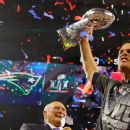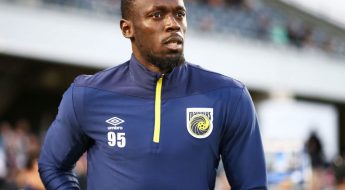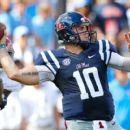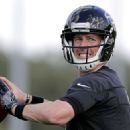$200 sleepwear? Brady's TB12 brand comes at hefty price

Tom Brady hasn’t talked much about his business plans for after he leaves the game, but filings to the U.S. Patent & Trademark Office in the past seven months made by his representation suggest that the five-time Super Bowl champion is going all-in on the health, nutrition and physical fitness space.
Yee & Dubin Sports has filed for 23 trademarks — 22 attached to a variety of products and services for Brady’s TB12 brand and one for the motto of his TB12 Center, “Sustained Peak Performance.”
One by one, Brady’s website has started selling items for which trademarks have been filed.
A protein powder. A cookbook. Exercise mats. A weighted vest. A medicine ball.
Then there’s performance sleepwear, which Under Armour recently started selling with the TB12 brand for $200 for top and bottom.
The TB12 Sports Therapy Center in Patriot Place near Gillette Stadium serves as the hub for Brady’s business operations.
Based on the idea that everyone could benefit from how Tom Brady has trained, the business charges $250 for an initial 90-minute evaluation. Customers get their food diaries analyzed and their therapy/body work customized.
They are given a body coach, who interacts with them in person for $200 a session. It includes servicing over the phone for additional exercises and needs.
It’s expected that in order to make an impact that is meaningful to Brady’s coffers, the model would be replicated in places across the country. But being branded by one of the greatest players of all time isn’t enough.
The cookbook, which Brady calls a nutrition manual, has sold out at $200 a pop several times, but quantities were never revealed. The protein business, for example, is very brand-loyal, and the Brady premium is hefty.
BiPro, which makes Brady’s protein powder, sells a pound of its own Whey Protein for $36, while Brady’s retails for $54.
Then there’s the question about what type of role model Brady is himself and whether the man behind his routines is even credible.
His personal chef, Allan Campbell, told The Boston Globe that the quarterback only eats organic, eats no white sugar or white flour, has no coffee, caffeine or dairy, and doesn’t eat tomatoes, peppers, mushrooms or eggplants. He also doesn’t eat fruit.
New York-based registered dietitian Lauren Harris-Pincus recently told the New York Post that many of Brady’s reasons for avoiding these foods are “sketchy” and some claims made by Campbell have been debunked.
There’s also Brady’s association with Alex Guerrero, who is the mastermind behind Brady’s training and the performance center. Two of Guerrero’s products have come under scrutiny by the FTC — one called Supreme Greens, which claimed to help cancer and diabetes patients, and another called Neurosafe, a drink that was marketed as preventing the effects of head trauma.
Aside from workouts, Brady preaches pliability, which he says is meant to “keep your muscles long and soft.” Brady has marketed the method he and Guerrero use as being more effective than traditional physical therapy. If Brady can ever get insurance companies to pay for it in the way they pay for physical therapy, it’d be a huge cash cow.
On Sunday, Brady did his part and added another legendary performance to his lore. But it’s still unknown whether the masses will buy the classic marketing pitch: What made him could help make you, too — especially because really turning it into a robust business means selling it outside of New England.






